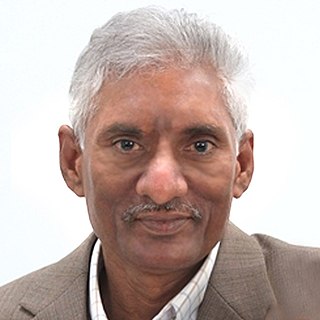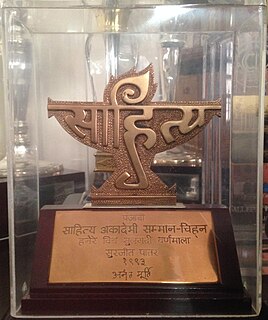Indian poetry and Indian literature in general, has a long history dating back to Vedic times. They were written in various Indian languages such as Vedic Sanskrit, Classical Sanskrit, Hindi, Oriya, Tamil, Telugu, Kannada, Bengali and Urdu. Poetry in foreign languages such as Persian and English also has a strong influence on Indian poetry. The poetry reflects diverse spiritual traditions within India. In particular, many Indian poets have been inspired by mystical experiences.Poetry is the oldest form of literature and has a rich written and oral tradition.

Cingireddi Narayana Reddy, better known as C. Narayana Reddy, was an award winning Indian Telugu poet and writer. Reddy had produced over eighty literary works including poems, prose-plays, lyrical plays, translations, and ghazals. He was also a professor, lyricist, actor, and politician.

Gurram Jashuva was a Telugu poet.His real name was Anil Kumar.He was an IAS aspirant.He fell in love at tender age and became a poet.For that he was recognized with awards by Government of India. His literature's impact on the society was studied by researchers. Literary awards were instituted in his memory.
Vajjala Shiva Kumar is a well known free verse Telugu poet. Vajjala Shiva Kumar was born in 1956 in Vemulawada, Karimnagar district, Telangana. He is the only son of Vajjala Samba Shiva Sharma and Radha Bai and was born and brought up in Vemulawada a temple town. Retired librarian from Kendriya Vidyalaya Sangathan he is currently living with his family in 'Shivananda Lahari'1-20-198/2,Gokul Nagar, Venkatapuram, Secunderabad-15.

Attoor Ravi Varma is an Indian poet and translator of Malayalam literature. One of the pioneers of modern Malayalam poetry, Ravi Varma is a recipient of Kendra Sahitya Akademi Award, Kerala Sahitya Akademi Award for Poetry and Kerala Sahitya Akademi Award for Translation, besides many other honours. The Government of Kerala honoured him with their highest literary award, the Ezhuthachan Puraskaram, in 2012 and the Kerala Sahitya Akademi inducted him as their distinguished fellow in 2017.
Gunturu Seshendra Sarma B.A. B.L., also known as Yuga Kavi, was a Telugu poet, critic and litterateur. He is well known for his works Naa Desam, Naa Prajalu and Kaala Rekha. He authored over fifty works which have been translated into English, Kannada, Urdu, Bengali, Hindi, Nepali and Greek.
Bhadriraju Krishnamurti was an Indian Dravidianist and linguist. He was born in Ongole. He was Vice Chancellor of Hyderabad Central University from 1986 to 1993 and founded the Department of Linguistics at Osmania University where he served as professor from 1962 to 1986. His magnum opus The Dravidian Languages is considered a landmark volume in the study of Dravidian linguistics.
Madhurantakam Rajaram is considered one of the foremost of modern Telugu short story writers. He is the winner of Sahitya Akademi Award of 1993 and Katha prize for short stories for the years 1991 and 1993.
Butchi Babu was the pen name of an eminent Telugu short story writer, novelist and painter. His real name was Sivaraju Venkata Subbarao.

Bhargavi Prabhanjan Rao, a Sahitya Akademi Awardee, was an eminent translator in Telugu Literature. She was actively involved in translating various works of celebrated author and playwright Girish Karnad. Her most famous works include Noorella Panta, a compilation of one hundred short stories by women writers of twentieth century is acclaimed as a landmark in Telugu literature. She died due to a heart attack on 23 May 2008 in Hyderabad.
Mohammad Ismail is an Indian Telugu-language poet, critic, academic and university administrator.

Palkuriki Somanatha was one of the most noted Telugu language writers of the 12th or 13th century. He was also an accomplished writer in the Kannada and Sanskrit languages and penned several classics in those languages. He was a Shaiva by faith and a follower of the 12th century social reformer Basava and his writings were primarily intended to propagate this faith. He was a well acclaimed Shaiva poet.
Su. Samuthiram, was a Tamil writer from Tamil Nadu, India.
Ka. Naa. Subramanyam was a Tamil writer and critic from Tamil Nadu, India. He is also popularly known by his Tamil initials as Ka. Naa. Su.

Viswanatha Satyanarayana was born to Sobhanadri and Parvathi in the year 1895 at Vijayawada, Krishna District, Andhra Pradesh. He was a Telugu writer of the 20th century. His works included poetry, novels, drama, short stories and speeches, covering a wide range of subjects such as analysis of history, philosophy, religion, sociology, political science, linguistics, psychology and consciousness studies, epistemology, aesthetics and spiritualism. He was a student of Chellapilla Venkata Sastry. Chellapilla was familiar to be known as Tirupati Venkata Kavulu duo, Diwakarla Tirupathi Sastry and Chellapilla Venkata Sastry. Viswanatha's style of poetry was classical in nature and his popular works include Ramayana Kalpa Vrukshamu, Kinnersani patalu and Veyipadagalu.
Paloor Madhavan Namboothiri, commonly known as M. N. Paloor, was a Malayalam-language poet from Kerala, India. He was one of the early modernist poets in Malayalam but his writings were steeped in the poetic tradition of Malayalam. He was a recipient of the Kerala Sahitya Akademi Award, the state's highest literary honour, in 1983 for his collection Kalikalam. He also received the Kendra Sahitya Akademi Award for his autobiography Kathayillathavante Katha in 2013.

Dr. N. Gopi is an eminent Indian poet, literary critic in Telugu and Sahitya Akademi Award recipient. He has also been in the University system as a professor and Dean since 1974, until retiring in 2008. He has also held the post of the Vice Chancellor of Potti Sreeramulu Telugu University, Hyderabad. A humanist to the core, Gopi exudes nativity and national outlook in his poetry.

Dr. Papineni Sivasankar, a doyen of Modern Literature in Telugu, recipient of Sahitya Akademi Award, 2016 is an Indian poet, short story writer, and critic.








